navire - 2902 Sep 2016
Rotuma, the final Fijian Island=09 Position: 12 29.239s 177 07.227e (Posted from Majuro September 2016) David We arrived at Rotuma early this morning, negotiating our way through coral=20 heads, to drop anchor in five metres of turquoise liquid jewels over clear white=20 sand. Black, chunky volcanic rock cloaked in palms and huge mango trees with=20 virgin sand oases tucked among the muscular rock. *** Janet Anchor down on this last piece of Fiji, I squeezed in an hour of sleep but a visit to=20 shore was a more pressing need than a longer nap. We wanted access to internet=20 to get a wider range of weather forecasts than we could get aboard. But first, a=20 long overdue shower was in order. Ladder down, lifelines down, solar shower=20 rigged in the cockpit, I dove over the side. The water was silky on my skin, the=20 warmest temperature to date now that we were 12 degrees of latitude south of=20 the equator. To give you some perspective, Wellington is at a chilly 42 degrees=20 south. I climbed out of the water, soaped up, leapt in again and washed off. Then=20 a fresh water rinse under the camping shower and layers of sweat and salt=20 lathered off. I felt clean, for about an hour, till the next outpouring of sweat=20 liberally coated me. David wanted to stay with the boat to make sure the anchor was set safely, so=20 Kailopa and I headed to shore in the dinghy. There was one other yacht in the=20 anchorage, a French boat, Menkar, with a father and son team. We stopped for a=20 brief chat about weather. We'd been hoping to leave on Monday of the following=20 week but Giles and Sylvan said there was very light wind and it had too much=20 east in it, which the weather map later confirmed.=20 We were now in a band of weather called the Inter Tropical Convergence Zone=20 (ITCZ) otherwise known as the doldrums or horse latitudes. This is an area=20 where the northern hemisphere trade winds meet the southern hemisphere=20 ones. This creates an area of low pressure with light winds or no wind at all, and=20 is often punctuated by unpredictable squalls. These mostly hit at night, usually,=20 accompanied by torrential rain and a sustained blast of wind from any direction.=20 They last about ten minutes. This band of low pressure floats up and down=20 between the north of Fiji and the equator, and is sometimes broad and=20 sometimes quite narrow in width. Ideally we would set sail north when it was=20 narrow to reduce the chance of being becalmed and having to motor. If the cloud=20 we saw on the charts was the ITCZ it would be squally out there. We changed our=20 plans, again. *** Stepping on land after being at sea was like going from black and white to full=20 colour. The sea was bright blue, the sand intense white. Behind the beach there=20 was a park-like area laid out with vibrant green coconut palms, then the burst of=20 bright colours of the gardens in the village. Just along the road we met a=20 Jehovah's Witness family (Kailopa's religion) who were just lovely, Leta and=20 Funmanu, and their son Ian. We arranged with Ian about where to watch the=20 rugby, the final game of the World Cup, on early the next morning. *** David We started our second day here at 4 am, ashore watching the All Blacks win the=20 Rugby World Cup. Wahoo!! =20 We meandered back to our dinghy in blissful euphoria, as though we had=20 personally secured the win. Our first glimpse of the anchorage was of Menkar=20 slewing down the face of a two-metre swell, surely headed for the black rock=20 shore. High on the crest she slid down the back of the surging wave which broke=20 in a cloud of foam and green water, Menkar rolling gunnel to gunnel but safe. Janet and I picked a moment between surges to push our wee dinghy through the=20 foam into deeper water. The darling outboard started first pull and we motored=20 out to Navire, also rolling alarmingly. Where had this frightening surge come=20 from? We had to get out of there. We shipped the outboard and dinghy in double quick time while close by the=20 supply ship, rolling hard on the concrete wharf, prepared to leave. We had=20 wondered and worried about how this small ship would maneuver so close to us.=20 Perhaps the wind would catch the bow as she tried reversing out and force her=20 down onto Navire. I had little time to worry about this as we wound in our=20 anchor. As it turned out she made a graceful exit stern first, well clear of Navire. In the meantime Menkar noticed their own predicament and were getting under=20 way.=20 Our two yachts and the small ship left the anchorage together. All re-anchored=20 well out from shore and the breaking rollers. *** Janet The French came for a drink. They were great company and they too were=20 heading north. We communed about weather. Another boat arrived that evening.=20 Exodus is a 40' catamaran with an American family aboard. Deanne and Tim a=20 pair of aeronautical engineers, and their two teenage boys. They were to become=20 our close companions for the next two months.=20 *** Monday Nov 2.=20 So near and yet so far. We slid up and over the swells as they rolled into the=20 anchorage, the stunning white sand beaches, black rocks and palms trees less=20 than half a mile away but it was just too rough to go and anchor closer to shore.=20 I woke at four that morning and downloaded another weather forecast- the next=20 two days good wind but then going light. We were hoping that with lighter winds=20 the waves would stop wrapping around into the bay, and we could get in to=20 shore. Usually we use the internet to get our weather from a number of sources -=20 Windyty, Metvuw, New Zealand Metservice surface pressure charts, and more=20 latterly Hawaiian ones that cover the equator region. But at Rotuma we had to=20 rely solely on what we could get through the single sideband radio. We have a=20 modem that translates radio signals into something the computer reads. Our=20 main weather information source is grib files. On a map of the world on the=20 computer screen I highlight the area I want a forecast for, identify the duration=20 and at what hourly intervals I want the forecast for. Usually I get seven days at=20 12 hour intervals. I often get up in the night to get a good signal which means a=20 fast download. During the day its often impossible to get a connection, mornings=20 and evenings between six and nine are an okay signal and speed but its hard to=20 find a free channel as everyone else in the Pacific is using it at that time.=20 *** The constant roll of the boat made me feel like I was on the alert all the time. I=20 didn't feel safe out there compared to being tucked in the bay. However Kailopa=20 didn't seem concerned at all and sat in the cockpit and fished patiently for hours.=20 He really was serenity embodied. A salutary lesson to me, this perpetually busy=20 Palangi.=20 He caught us a pilot fish (Remora) for lunch. This skinny fish has a suction pad on=20 the underside of its head, which it uses to stick to sharks. It stuck to the chopping=20 board while I was cutting through its leathery skin. I asked Kailopa how to cook=20 it and he said, "Boil it." as they do with most foods here. Despite thinking 'Surely=20 boiling fish must make it tough,' I put the chunks of flesh, skin and all into a pot=20 and boiled them. As I took the pieces out of the water the skin just fell off. I put a=20 chunk of fish into my mouth and to my delight it was tender, succulent and=20 sweet. We had a futile attempt at taking Navire into the bay but it was still too rolly and=20 squally and we retreated further out again. *** November 4 David and Kailopa toured the island. See next post. *** Nov 5, No Guy Fawkes celebration for us in this land, despite it too being colonised by=20 the British, but what a party we attended for our last night on Rotuma, our final=20 night in Fiji. David had been in to the wharf to collect Kailopa and came back without him. "There's a kava party on at Phillippe's house, Kailopa is there," he said. "Want to=20 come?"=20 "Love to." I'd been on board all day preparing to go to sea and was glad to get a=20 change of scenery. On shore we walked through the coconut palm grove talking about the likelihood=20 of a coconut falling on our head. Along the road we saw Phillippe's house, a grand=20 affair amongst the typical small Fijian houses. The only sign of life in the rapidly=20 falling dusk was a rhythmic banging sound. We'd been in Fiji long enough to=20 know the sound of kava being pounded. David peered around the back of the=20 house and there was Kailopa sitting on a mat with a group of Rotumans,=20 gathered around a kava bowl. Two of the men were playing guitars. A lively woman, Rikiti, greeted me warmly, having met David earlier. She was of=20 Banabian (Kiribati) descent, from the Fijian/Banabian island of Rabi. We were=20 immediately offered bowls of kava. Despite being evening and being near the=20 shore it was hot and sweat dripped down my face. Rikiti disappeared around the=20 corner of the house and came back five minutes later with woven fans and=20 mosquito coils By then I had covered myself from head to toe with a sulu to=20 prevent the insects feasting on me. "Every night we do this," she said, "after working our at jobs on the farm we=20 come here and have kava and music."=20 What, no rushing home to cook dinner, answering emails, cleaning house? I could=20 learn from this. *** November 6, 2015 6am ritual. Computer on, radio on, Airmail programme up, select the gribs, send,=20 connect. I was still looking for a weather window to get us to Tuvalu. There were=20 several conflicting forces. For sailing ideally we should wait for wind, from a=20 useful direction too. For seeing Rotuma we should stay another week and keep=20 exploring. For Kailopa we should get him to Tuvalu. For this time of year we=20 should get out of there as it was now cyclone season and we were still in the=20 zone.=20 In the end we used the "go anyway, the forecast is often wrong" strategy, which=20 works as often as not. We got word to the officials in the village on the other side=20 of the island that we wanted to check out of Fiji. They came aboard the next=20 morning to carry out the formalities giving our passports a final stamp. We were=20 on our way north into new territory. ***
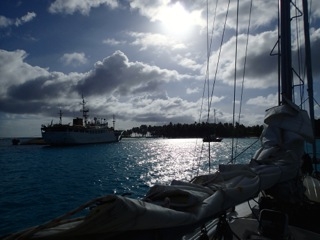
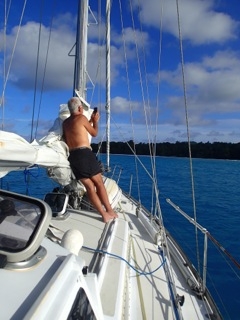
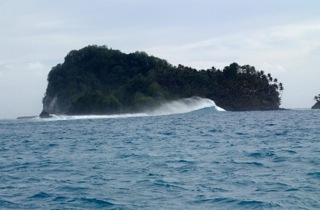
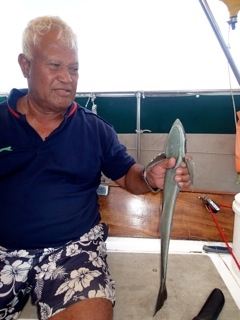
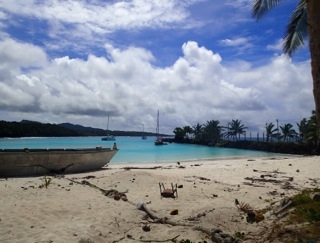
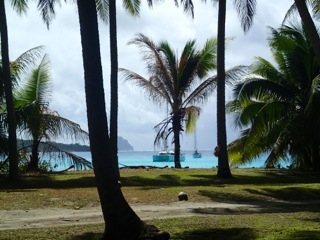
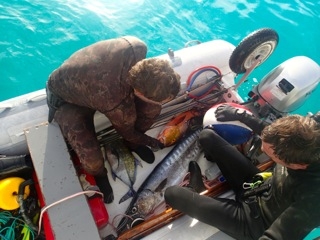
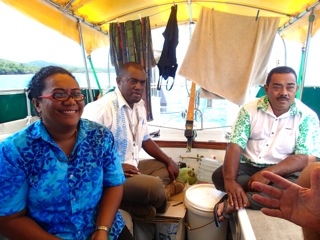
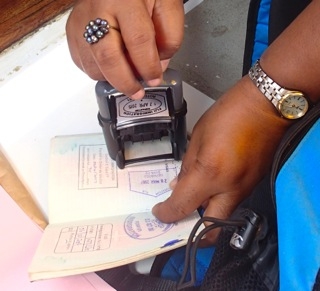
Add new comment